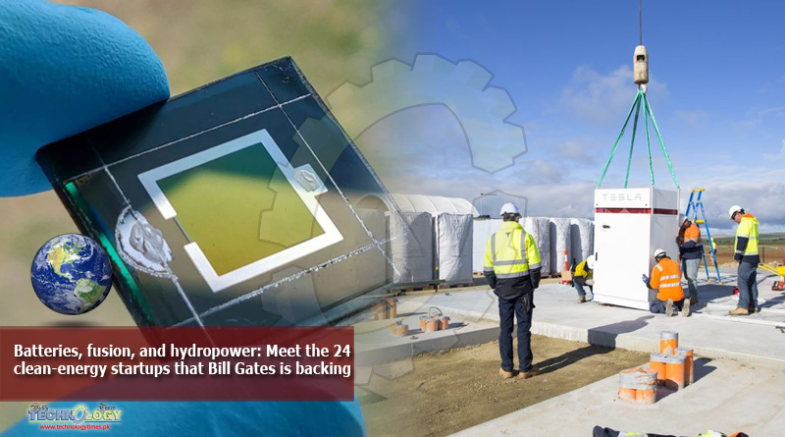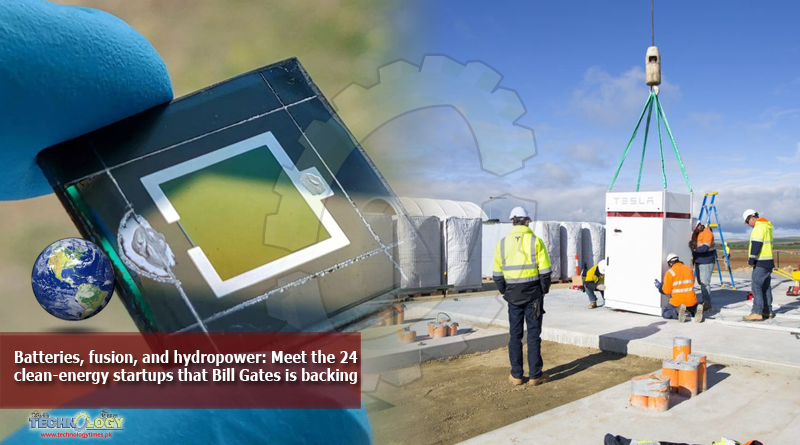Microsoft cofounder and former CEO Bill Gates is the second richest person in the world, with a net worth over $100 billion. He’s invested a sizeable chunk of cash into clean-energy companies, largely through a billion-dollar fund he spearheads called Breakthrough Energy Ventures.

- Most of the startups he funds address three solutions Gates says are necessary for the clean-energy transition: Long-duration storage, nuclear energy and carbon capture, and power transmission.
- Business Insider compiled a list of the 24 clean-energy companies that Gates has invested in, using data from PitchBook.
- Visit Business Insider’s homepage for more stories.
Bill Gates is rich. His net worth is on the order of $100 billion, according to Forbes’ real-time billionaires list, making him the second-wealthiest person on the planet.
He’s also one of the most generous, as measured by how much money he’s given away. Through the Bill and Melinda Gates Foundation, Gates and his wife have dished out about $50 billion since 1994 to support public health, education, and development.
But what Gates receives less attention for is his investments in startups — of which there are dozens. Many of them fall into the category of clean energy.
“What’s needed are affordable ways to bring clean energy to nearly a billion people who deserve more access to electricity,” Gates said in a video that’s part of his personal blog, Gates Notes. “That’s why I’m making investments in clean, affordable, and reliable ways to generate electricity, and I’m encouraging others to do the same.”
Gates’ most public venture vehicle is a $1 billion fund he spearheaded with a coalition of other extremely high-net-worth individuals called Breakthrough Energy Ventures (BEV). Richard Branson, Michael Bloomberg, Ray Dalio, and Vinod Khosla are all investors in BEV, one of the world’s most active clean-energy venture funds.
“Our goal is to generate a financial return on our investments, each of which will have the potential of significantly reducing greenhouse gas emissions,” the fund’s website says.
Gates has also invested in startups through other funds including Gates Ventures, Cascade Investments, and Village Global, according to the startup finance database PitchBook.
Most startups he backs are working on one of three solutions that Gates says the world needs “for the transition to clean electricity,” according to his blog.
The first is long-duration energy storage — essentially, big batteries that can store power for days or months.
“Finding ways to store that energy to use after the sun sets and the wind stops blowing is a big challenge we need to solve,” he wrote in a blog post.
The second is a mix of nuclear energy and carbon capture, a seemingly unusual pairing. Citing an MIT study, he said that if the energy transition includes nuclear power and carbon capture and storage technologies — which can reduce emissions from fossil fuel plants — it would “make carbon-free electricity up to 62 percent cheaper than using renewables alone.”
Finally, he says we also need high-voltage, long-distance power lines that can send direct current from renewable energy sources to areas of demand.
“Connecting our renewable energy supply with demand will require us to build transmission lines that can handle large amounts of power over very long distances,” he said.
Business Insider compiled a list of clean-energy startups that received investment from Gates or one of his investment funds, according to data from PitchBook and company statements.
The startups below are listed by how much total capital they’ve raised in increasing order.
Bluefield Technologies — $2 million
Year founded: 2017
What it is: The startup measures methane emissions using imagery gathered by backpack-sized satellites. “Our sensor detects the spectral signature of methane in sunlight that is reflected off the ground. We then use machine vision algorithms to further enhance the optically rich data our sensor captures,” the company’s website states.
Total raised: Over $2 million, the company said in a statement
Other notable investors: Sequoia Capital and former Microsoft executive Charlie Songhurst, according to the company
Seaborg — $6 million
Year founded: 2014
What it is: Denmark-based Seaborg is developing compact molten salt nuclear reactors designed to limit waste. The startup is planning to have commercial reactors by 2027.
Total raised: About $6 million in equity. That doesn’t include an additional $2 million in grants, the company said in a statement.
Other notable investors: PayPal cofounder Peter Thiel, according to PitchBook
Quidnet Energy — $8 million
Year founded: 2015
What it is: A startup that develops a pumped-hydro energy storage technology. Water is pumped into an underground cavern, where it becomes pressurized, and then released to power energy-generating turbines.
Total raised: About $8 million, the company said
Other notable investors: Clean Energy Venture Group and the Will and Jada Smith Family Foundation, according to PitchBook
Heliogen — $9 million
Year founded: 2013
What it is: The startup’s system uses a mosaic of mirrors to concentrate sunlight, which generates extreme heat necessary for industrial processes like cement or steel manufacturing. The technology could eventually replace fossil fuels in those processes, as Business Insider previously reported.
Total raised: About $9 million, per PitchBook. A company spokesperson declined to share the total capital raised and mentioned that Heliogen is preparing to announce new funding.
Other notable investors: Energy giant NRG Energy and Brad Feld, cofounding partner of Foundry Group, according to PitchBook
Arnergy — $9 million
Year founded: 2013
What it is: Nigeria-based Arnergy sells distributed energy solutions, such as rooftop solar and storage, in emerging markets.
Total raised: About $9 million, the company said
Other notable investors: Norfund, a private-equity fund founded by the Norwegian government, according to PitchBook
Fervo Energy — $11 million
Year founded: 2017
What it is: California-based Fervo Energy is a geothermal energy startup. Geothermal energy typically refers to using the heat stored in the Earth’s crust to power turbines or heat homes.
Total raised: About $11 million, per PitchBook
CarbonCure — $11 million
Year founded: 2007
What it is: CarbonCure sells a technology that enhances concrete using recycled carbon dioxide, or CO2. The company pumps CO2 into wet concrete while it’s being mixed, at which point the gas reacts with water and calcium ions in the cement, forming solid limestone. The carbon is stuck in the limestone indefinitely. What’s more, is that this mineralization process makes ready-mix concrete slightly stronger than some alternatives, according to the company.
Total raised: About $11 million, per PitchBook. That amount does not include recent, undisclosed funding. The company declined to share the total capital it’s raised.
SparkMeter — $14 million
Year founded: 2013
What it is: SparkMeter designs and sells smart meters and other equipment to utilities in developing markets. The startup’s technology “enables utilities operating in remote locations to access a range of features — prepaid billing, customer communications, and remote monitoring and control — that improve their operations and help them achieve financial sustainability,” the company’s website says.
Originally Publish at: https://www.businessinsider.com/
